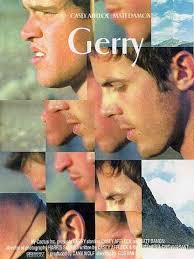
GERRY
US, 2001, 103 minutes, Colour.
Matt Damon, Casey Affleck.
Directed by Gus van Sant.
The name of director, Gus Van Sant, has been associated with offbeat comedy and drama like My Own Private Idaho and To Die for as well as the feelgood Good Will Hunting and Finding Forrester. He won the Palme D' Or at Cannes 2003 with his brief portrait of a school and the gun culture, Elephant. Before Elephant, he made Gerry. It takes him back to his experimental roots and his exploring the ways in which cinema communicates. If that does arouse interest, it is best to stay away from Gerry.
In a way, one could call the film boring in an interesting way or interesting in a boring way. Van Sant acknowledges European director, Bela Tar, as an influence, a director who is unafraid of long, long (very long) takes, making his audience stay with whatever passing landscape he chooses or focus on a character. For those who prefer action, perhaps patience is not enough.
Having said that, there is q great deal in Gerry. It is not so much what is happening on the screen: two friends go for a hike, get lost and wander the mountains and flats for several days looking for water. It is rather how everything is
communicated by the widescreen process, the magnificent colour photography, the editing and its pace, the music of Arvo Part. As the men wander, getting more tired and bewildered, we watch but, as we might do if we were there, not concentrate on the focus all the time, but look at them, then at the scenery and our minds and attention might wander as well.
Why they went hiking without water or food and why they did not take notice of the way they went, gives us something to think about. And, the dreadful fact that no one knew they were there, no one was looking for them, and they say nobody passing by. Being lost in the desert is a strong metaphor for being lost in life. Some of this is suggested in the interactions between the two men, both called Gerry, played by Matt Damon and Casey Affleck who contributed to the screenplay. But it is suggestion rather than elaboration. This is an experience of having to gaze at pictures, moving pictures.
1. The work of Gus van Sant? Experimental? Mainstream? His place in American cinema? His being influenced in this film by European film-making, especially that of Bela Tar?
2. The use of landscapes: locations in Argentina, in Death Valley, Utah? An American wilderness setting? The mountains, the desert? The lack of vegetation, lack of water? The symbolic nature of the desert and people being lost in deserts?
3. The camera style, the very long takes, the silences, the tracking shots of the landscape, the circling of characters? The camera work not making concessions to the audience and audience patience?
4. The musical score, the work of Arvo Part?
5. The title, both men being called Gerry, their use of the word "gerry" as a verb to describe their activities? The personalising of the characters - yet their anonymity?
6. The introduction to the characters, the long shots of the travel in the car, their getting out, walking, the brief encounter with the people, their breathing the air, going on the hike? Their relationship of friendship, dependence on each other? Different characteristics of leadership? Who was the decision-maker?
7. The trek, the experience of the wilderness, their getting lost? The fact that they went out without hat, water, map, taking notice of where they went? Audiences identifying with them in losing their way? The possibility of this happening to anyone? The consequences?
8. Their walking through the desert, the range of landscapes, their looking for water, following the animal tracks, going into the desert? Climbing the mountains? Unable to find water? The beating sun? The days passing, their being disoriented? Their attempts to remember where they had come? The failure? The aimless wandering, the mirage in the desert?
9. Really being lost, nobody knowing where they were? Their collapsing? Burnt by the sun, lacking water, lacking energy? The way that they talked with each other - the ironic humour? The tears? Blaming themselves and not each other?
10. Their lying on the salt plain, the man unable to go on, the other man deciding to end his life? His getting up then, wandering, finding the highway, seeing the outline of the cars?
11. His sitting in the car, remembering, the look at the young boy, the driver and his looking in the mirror? The reflections going through his mind?
12. The content being straightforward and not so very interesting in itself? The importance of the style and how the plot was communicated? Camera styles, colour photography, editing, experimental use of camera, flashbacks of the road, symbolic memories? The overall impact of this film and this kind of film-making?